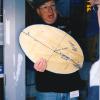Log, Mar 20, 2009
18 people. Francine and Les both had to attend a Frosty Drew directors meeting and so we couldn't be sure if we would open or not. Frankly at 5 PM, things were very doubtful but they improved to the point where the sky was clear if not particularly stable. As far as I can tell, there were two streams of air over the Observatory that rubbed against each other and caused the air to dance. For example, late at night Saturn was very bright, as many as 7 moons were visible and as many as 3 sets of rings. Oops - Saturn only has 1 [one] ring set - the other two were created by air turbulence. The sky was dark but looking for faint objects was very difficult.It has been a while since we visited the Realm of the Galaxies. The area of the sky centered about Leo, Coma and Virgo contain a super-group of galaxies of which our local group [MWG, Andromeda, Triangulum and the small fry] is merely a tiny distant offshoot. Mammoth M86 [thousands of time larger by itself than our whole local group] was bright if not very sharp. In fact, its fuzziness caused people to ask us to focus. We explained that a collection of trillions of stars is NEVER sharp but a huge swarm of the tiniest of points of light.We couldn't actually get to Venus tonight. It is so close to the Sun that the automatic software overrides stopped us. In any case, it was just a scant degree or two above the horizon just after sunset. M42 was as spectacular as ever and it wasn't just the kids who were impressed by our nearest stellar nursery.Later in the evening, we tried some of the groups of galaxies which amateurs like to challenge each other with observing. "Twelve galaxies at one time in the eyepiece!" or some such silliness. A faint grey on slightly darker gray smudge deserves what it usually gets - a great deal of inattention. Actually, the brightness of galaxies is over rated. The total light from a galaxy is treated as if it can from a single point. So a modest galaxy may have a total brightness of say 10 which is more than easily seem in our telescope if it was a point of light. However it fades to invisibility if the galaxy is moderately large say 2 by 4 arc minutes. Imagine a 100 watt light bulb. Pretty bright. Imagine this 100 watt light bulb inside a translucent dirigible at night. I doubt you could see anything.-Les Coleman
- Author:
- Leslie Coleman
- Entry Date:
- Mar 20, 2009
- Published Under:
- Leslie Coleman's Log

